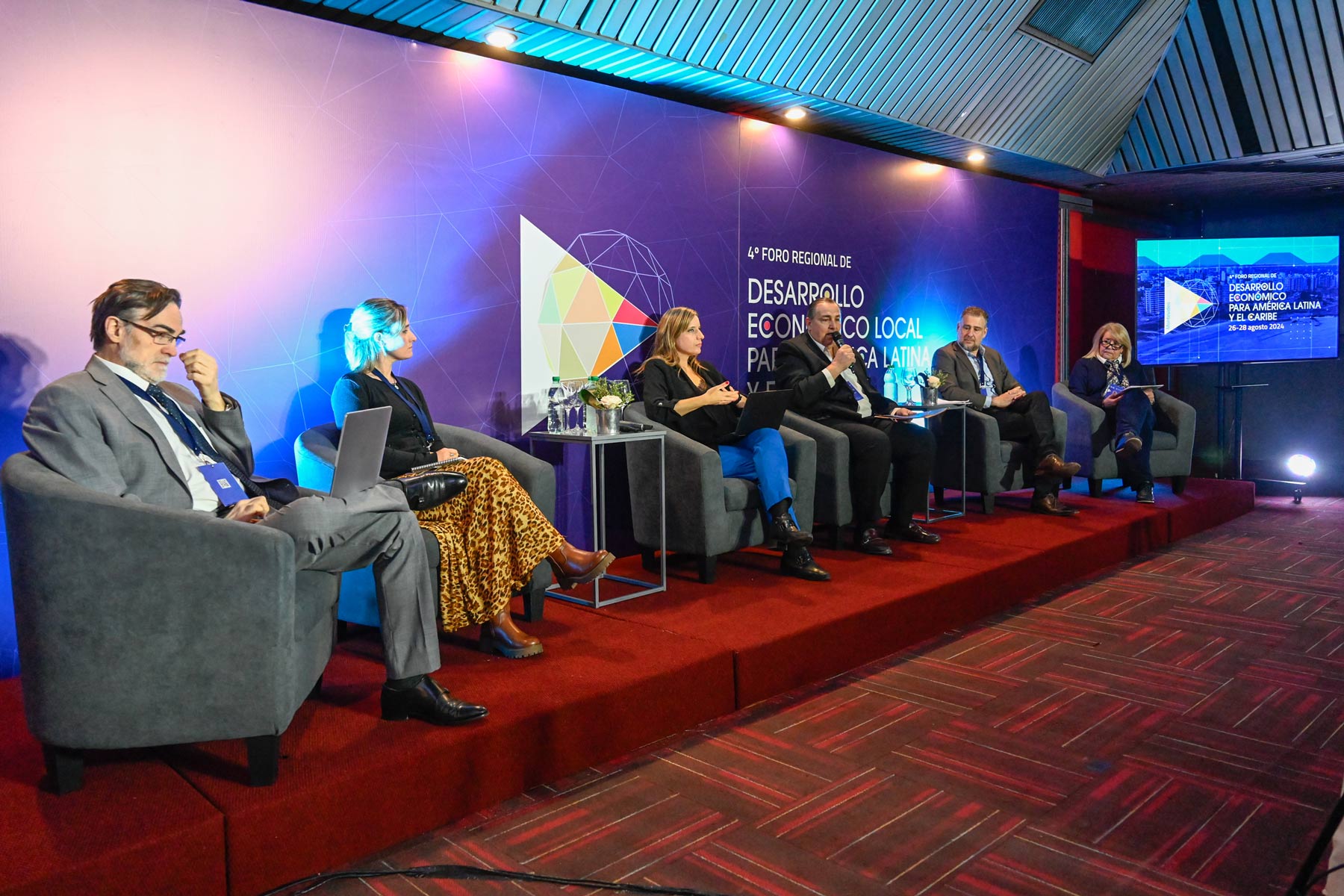On its second day, the 4th Regional Forum on Local Economic Development in Montevideo became a dynamic meeting point for leaders, academics and experts from various sectors, who shared innovative ideas and strategies to strengthen economic development in Latin America and the Caribbean. This forum is an important step on the path towards the VI World Forum on Local Economic Development, which will take place in 2025 in Seville.
The day began with an opening table titled “New perspectives and models for local economic development,” where prominent speakers offered brief words to mark the beginning of the event. Among them were Mauricio Zunino, mayor of Montevideo; Manuel Redaño, manager of FAMSI; Fabio Bertranou, director of the ILO for the Southern Cone of Latin America; Alfonso Fernández de Castro, resident representative of the UNDP in Uruguay; Ana Bentaberri, mayor of San José; and Patricia Soria, representative of the Departmental Board of Montevideo . The speakers shared their vision on the strategies necessary for a more resilient, sustainable and inclusive local economic development, setting the tone for the discussions and activities of the Forum and its link with the VI World Forum of Local Economic Development in Seville 2025.
Mauricio Zunino highlighted the importance of “democratizing the results of growth, addressing territorial and gender inequalities, with a vision focused on social inclusion, resilience and sustainability.” For his part, Manuel Redaño added that “if we overcome the pandemic, what will we not be able to face? Local governments are making global agendas a reality in areas such as energy communities, employment, cooperatives, tourism, circular economy, AI, and care economy.” Fabio Bertranou stressed that “today there is clear evidence that without subnational governments we will not achieve these goals, and the inequalities that already exist in Latin America will be exacerbated.” Alfonso Fernández de Castro emphasized that “the fulfillment of the goals of the 2030 Agenda will depend on the local and subnational world. We must find mechanisms to strengthen their role and their financing.”
Ana Bentaberri, for her part, mentioned that “San José has a Departmental Institute of Statistics to obtain real and specific data that allows us to plan more efficiently. With the 2030 Agenda as a framework, we have proposed to territorialize the SDGs in the department.” Finally, Patricia Soria stressed that “it is necessary to generate new perspectives that mainstream challenges, recognizing culture as an engine of economic development and fundamental for local development.”
In the second panel of the day, titled “The university and the knowledge society as keys to local economic development: new visions and innovation”, the transformative role that universities can play at the local level was explored. Organized by the Union of Universities of Latin America and the Caribbean (UDUALC), the University of the Eastern Republic of Uruguay and the Association of Universities Group Montevideo, this roundtable addressed specific strategies to promote socially and environmentally responsible entrepreneurship, discussing how these efforts They can be supported by public policies and local companies.
Another relevant table, co-organized by ADEC and the ADELCO NETWORK , discussed the topic of “Territorial alliances: development agencies and other instruments for the promotion of development in the face of new regional challenges .” The panelists discussed the main barriers that territorial development agencies face when coordinating efforts between the public and private sectors and civil society, highlighting the importance of intersectoral collaboration to overcome these obstacles. Various experiences and good practices of local development were also shared, highlighting the need for transversal, self-managed and community-focused projects through training and trust-building processes.
The empowerment of women and their economic autonomy was the central focus of the third panel of the day, co-organized by UN Women and the Global Alliance for Care , titled “Economic autonomy and empowerment of women . ” The speakers reflected on how government policies and programs can promote a cultural change that values and recognizes women’s unpaid work in the home, and how this would impact their ability to access economic opportunities and participate fully in the labor market.
During the afternoon, work tables continued that addressed crucial issues for local economic development from different perspectives. The session titled “Impact of climate change on economic development”, organized by ICLEI and ECLAC , was particularly relevant in the context of the current climate crisis. This table focused on analyzing how climate change affects economies and employment in the region, especially at the territorial level, offering different visions and theoretical contributions on the circular economy. Experiences were shared on how to minimize the impact of climate change in the region.
Another notable table was the one titled “New post-COVID local policies and alliances for people-based local economic development”, organized by the International Labor Organization (ILO) and the UCLG Local Economic and Social Development Commission. This session explored how local policies implemented in the wake of the pandemic have been instrumental in redefining economic development with a people-centered approach.
The workshops, which complemented the work tables, offered a space for a more interactive and in-depth debate. The first, titled “Transforming Public Management: innovation for territorial development” , organized by UNDP , explored how local action can be a catalyst for more productive, inclusive and sustainable economic development. The second workshop, “Climate change in local economic development” , organized by ECLAC, focused on the challenges that climate change imposes on the economy and how territories can adapt to be more resilient.


